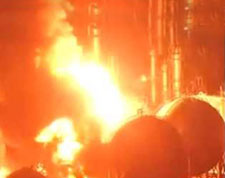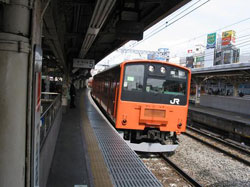Nuclear Power Industry Praying Japan Will Avert a Nuclear Disaster
Stock-Markets / Nuclear Power Mar 14, 2011 - 10:59 AM GMTBy: Martin_D_Weiss
 Explosions and meltdowns at nuclear reactors in Japan this past weekend will forever change the world of energy.
Explosions and meltdowns at nuclear reactors in Japan this past weekend will forever change the world of energy.
Authorities have already scheduled widespread power outages starting today — and they could continue the planned outages for weeks or even months.
|
But that’s just a metaphor for the sustained global energy shortages that are likely, as the safety and long-term viability of nuclear power comes under more intense scrutiny than at any time in history.
How do we know that’s the likely outcome?
Because prior nuclear disasters, such as Three Mile Island and Chernobyl, had a major long-term impact on nuclear plant construction.
Moreover, those two disasters were ultimately written off to antiquated facilities or poor safety precautions. In contrast, the Japanese nuclear industry prides itself on safety, and the plants struck by the earthquake had far better staff training and equipment, including multiple back-up systems, all of which failed.
Some nuclear experts will counter that newer and safer technologies now exist or can be developed. But given the history of similar promises in the past, those are bound to fall on deaf ears.
The public will now ask …
Is there a fundamental incompatibility between the potential dangers of nuclear energy and the unpredictable wrath of Mother Nature?
That question defies any quick answer and could take years to resolve. Until then, further growth in nuclear power production could be drastically reduced, with potentially far-reaching consequences:
- Chronic global energy shortages, especially in countries that were counting on new nuclear energy for a large portion of their electric power.
- Massive, long-term upward pressure on crude oil prices as producers, consumers, and investors upwardly revise their forecasts of fossil fuel demand.
- Vast sums of investor money diverted from nuclear power plant construction to other alternative energy sources, such as wind, solar, and bio-fuels.
Impact on the U.S. Nuclear Industry
In the U.S., no new nuclear power plants have come online since 1974, largely because of the Three Mile Island disaster. And still, nuclear energy accounts for 20 percent of the nation’s electricity supplies.
One new nuclear reactor is due to start production next year, and another 16 reactors are expected by 2020. But some of those could now be delayed, and any new plans could be ditched.
What does all this mean for the immediate future?
Even before the earthquake struck Japan on Friday, the House of Representatives had scheduled hearings on nuclear energy for this week, and Energy Secretary Chu is expected to testify the day after tomorrow.
So you can expect the entire focus of the hearings to shift to the unfolding disaster in Japan, with serious questions raised about its implications.
Again, expect mounting political pressure to delay or cancel construction plans, followed by massive upward pressure on crude oil prices, commodity prices and global inflation.
And all this assumes the situation in Japan gets no worse!
If there’s an even larger catastrophe than what we’ve seen so far, all bets are off: There’s no financial or econometric model in the world that can forecast what the global consequences might be.
But that’s not the only reason I’m praying Japan will avert a bigger nuclear disaster.
|
The other reason is that our son Anthony — and many of our friends — live in Japan.
When the Big One struck on Friday, Anthony was on the Chuo Line, pulling into the Akihabara station in the center of Tokyo.
Ironically, I didn’t learn about his whereabouts through typical communications. Instead, it was in a Los Angeles Times article that I was reading online shortly after the quake.
In fact, just as I was wondering where Anthony might be, there he was, “talking” to me — and thousands of other LA Times readers — about the train rocking sharply back and forth, dust and small debris falling, people scrambling for the doorways, and aftershocks continuing every few minutes.
Now he’s safe in his apartment on the other side of town, but our concern has shifted to the explosions and meltdowns at the nuclear reactors in Fukushima, 175 miles to the northeast.
It seems that, at each new stage of the unfolding disaster, officials add another new layer of vague promises and reassurances, always seeking to minimize the danger.
Their actions, however, speak louder than any words:
At first, they delay any aggressive steps as long as possible. Then they resort to desperate, last-ditch measures, such as flooding the reactors with salt water, destroying them forever.
At first, they evacuate only a few thousand residents in the immediate vicinity. Then, they evacuate hundreds of thousands.
They admit “minor meltdowns” are occurring, but fail to define what that means. A standard definition of “meltdown” is temperatures in the reactor core rising higher than 2,000 degrees Celsius, releasing dangerous levels of radiation into the atmosphere. And that’s precisely what has happened at the reactors in Fukushima, Japan. But how they manage to utter the word “meltdown” in the same breath as the word “minor” escapes me.
Prime Minister Naoto Kan declares that Japan is “facing its worst crisis in the 65 years since the end of World War II.” But still, neither he nor anyone in an official capacity seems willing to reveal any meaningful details.
The Japanese people are heroic in their preparedness, calm and stoicism. But government bureaucrats seem almost as concerned about information leaks as they are about radiation leaks.
We are not reassured.
Nor are investors who count on stable commodity prices. Indeed, it seems that …
Nearly every recent crisis or global trend creates ever scarcer natural resources and energy!
The unrest in the Middle East, which continues to deepen and spread, threatens the largest reserves of petroleum in the world. (See “Inflation surges! Silver near 31-year highs! Profit opportunities abound!“)
The disaster in Japan, which is far from over, could lead to massive political resistance against nuclear energy and far bigger demand for oil.
Most important, as we’ve stressed here continually, we are witnessing a long-term global shift of wealth and economic growth from the West to the East. Yet it’s in the East where we find the majority of the earth’s population, also driving up the demand for natural resources.
Everywhere, the upward pressure on prices is mounting.
My Recommendations:
- Keep most of your money safe in the strongest financial institutions you can find. (Stand by for a new Weiss Ratings press release on this subject.)
- Protect yourself against inflation with a stake in gold, using instruments like GLD.
- Plus, use any intermediate corrections to buy a stake in the most promising mining companies.
Good luck and God bless!
Martin
This investment news is brought to you by Money and Markets. Money and Markets is a free daily investment newsletter from Martin D. Weiss and Weiss Research analysts offering the latest investing news and financial insights for the stock market, including tips and advice on investing in gold, energy and oil. Dr. Weiss is a leader in the fields of investing, interest rates, financial safety and economic forecasting. To view archives or subscribe, visit http://www.moneyandmarkets.com.
© 2005-2022 http://www.MarketOracle.co.uk - The Market Oracle is a FREE Daily Financial Markets Analysis & Forecasting online publication.





